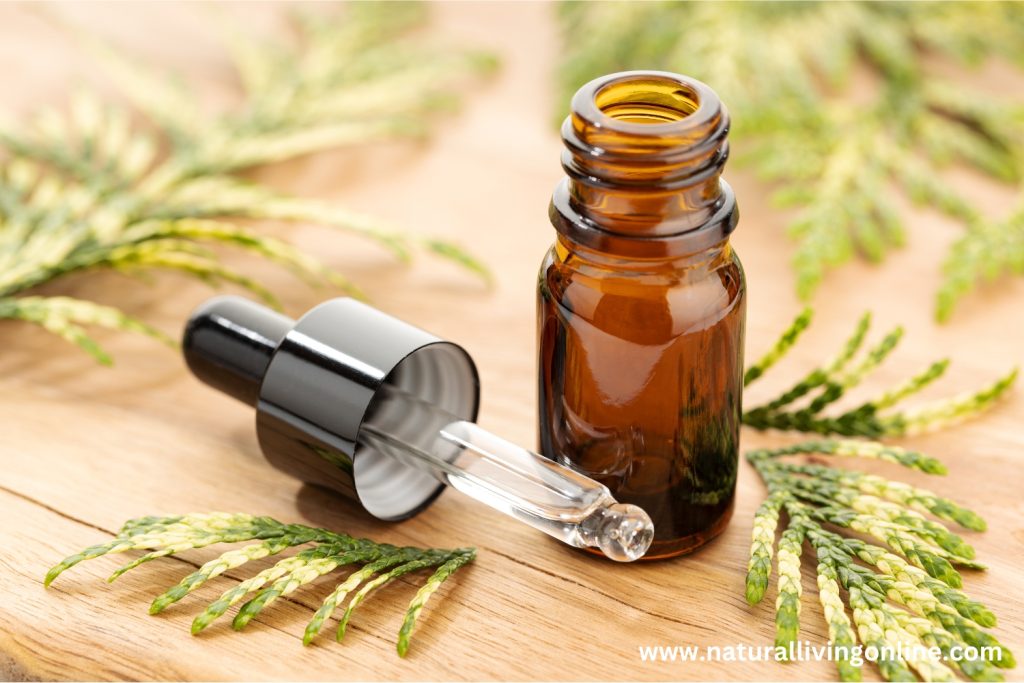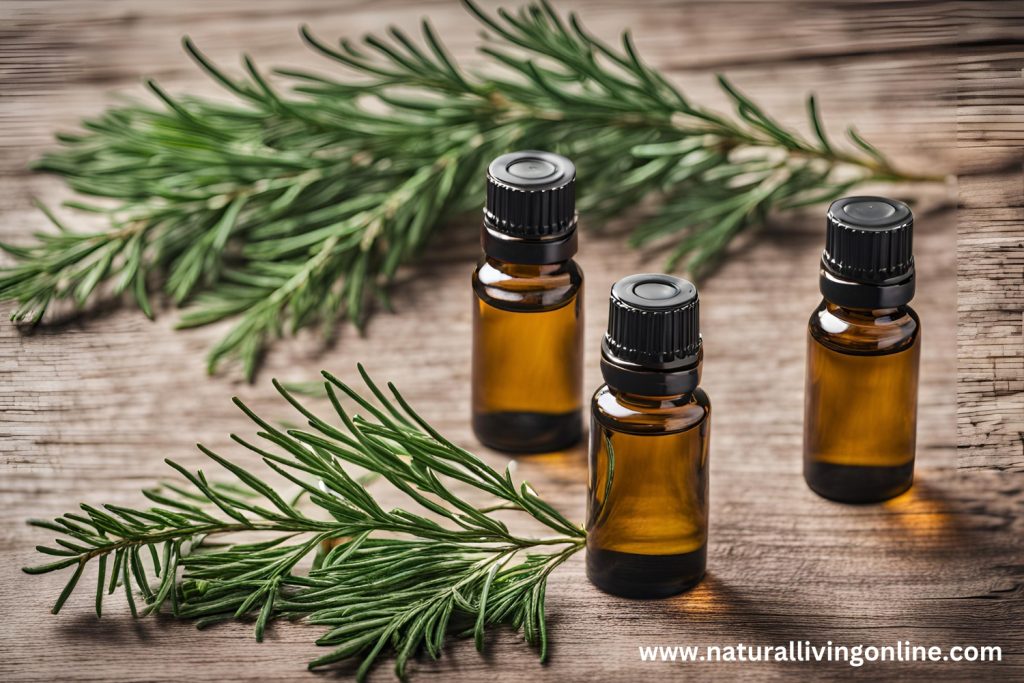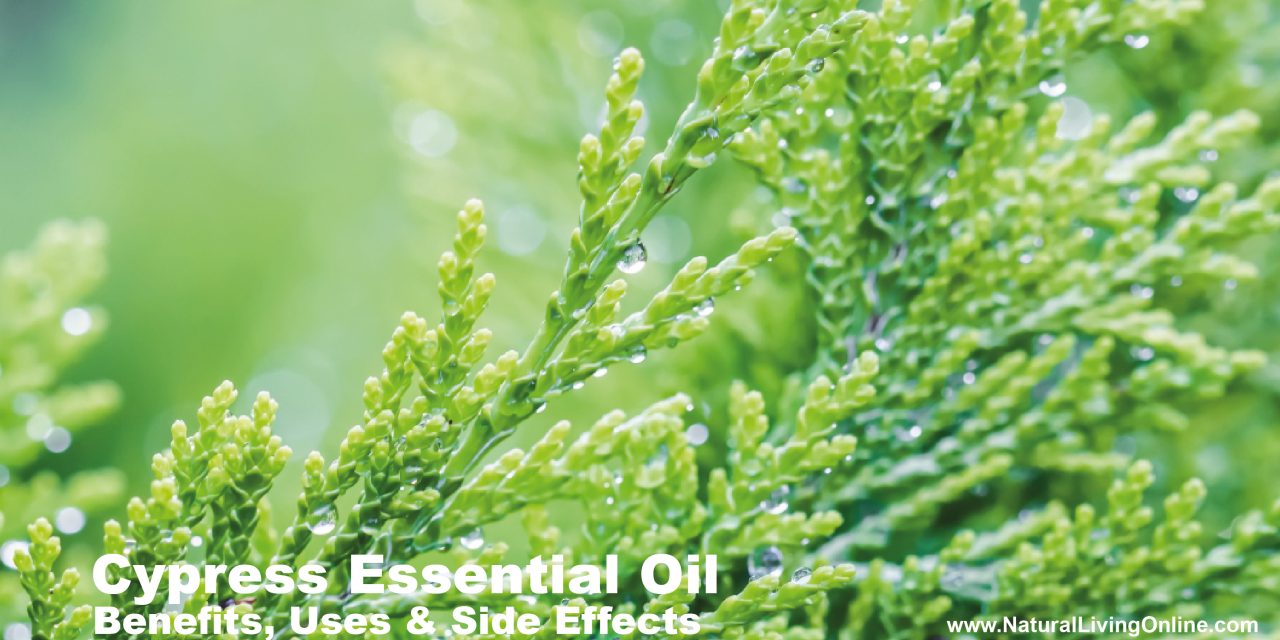Cypress essential oil, derived from trees in the Cupressaceae family, has been appreciated for centuries owing to its array of health benefits. This conifer-derived oil is obtained through steam distillation of young cypress twigs, stems, and needles, resulting in a fresh, clean aroma that is often associated with a sense of calm and grounding. Its therapeutic properties are wide-ranging, offering potential benefits from healing wounds and infections to serving as a natural deodorant.
Incorporating cypress essential oil into daily routines can be easily done through various methods of application including diffusion, topical blends, and inhalation. The oil contains compounds such as alpha-pinene and camphene, and blends well with other essential oils, enhancing its therapeutic effects. When you apply it topically, make sure to dilute it with a carrier oil to minimize skin sensitivity. While the benefits of cypress essential oil are substantial, you must also remain aware of safety and potential side effects to avoid adverse reactions.

Key Takeaways
- Cypress essential oil is valued for its ability to support wound healing and may reduce inflammation.
- The oil can be used in various forms, notably through topical application when diluted with a carrier oil or via aromatic diffusion.
- While beneficial, users should exercise caution to prevent skin sensitivity and understand the oil’s contraindications.
Essential Oil Profile
Botanical Name: Cupressus sempervirens
Common Names: Cypress, Mediterranean Cypress, Italian Cypress
Plant Family: Cupressaceae (Cypress family)
Countries of Origin: Cypress trees are native to the Mediterranean region, particularly southern Europe and western Asia, but they are also cultivated in other parts of the world.
Extraction Method: Cypress essential oil is typically extracted through steam distillation of the leaves, twigs, and cones of the cypress tree.
Parts Used: Leaves, Twigs, Cones
Essential Oil Smell: Cypress essential oil has a fresh, woody, and slightly spicy aroma with hints of balsamic and citrus notes. It is often described as clean, uplifting, and invigorating.
Essential Oil Color: Pale yellow to greenish-yellow.
Viscosity: Thin
Perfumery Note: Middle Note
Strength of Aroma: Medium
Blends Well With
- Citrus oils like lemon and bergamot
- Woody oils such as cedarwood and pine
- Herbal oils like lavender and rosemary
- Spice oils like juniper berry and black pepper
Therapeutic Properties
- Decongestant
- Antiseptic
- Antispasmodic
- Astringent
- Diuretic
- Relaxant
Uses
- Respiratory Health: Cypress oil is used to alleviate respiratory issues such as coughs, colds, and bronchitis. It can help clear congestion and support healthy breathing when diffused or used in steam inhalation.
- Skincare: Due to its astringent and antiseptic properties, cypress oil is used in skincare products to help tone and tighten the skin, reduce excess oiliness, and soothe skin irritations.
- Emotional Well-being: Cypress oil is often used in aromatherapy to promote emotional balance, reduce stress and anxiety, and uplift mood. It is said to help calm the mind and provide a sense of grounding and stability.
- Menstrual Support: Cypress oil is believed to have a regulating effect on the menstrual cycle and can be used to alleviate menstrual cramps and other discomforts associated with menstruation.
Contraindications
- Cypress oil is generally safe for topical and aromatic use. However, it should be used in moderation and diluted properly before applying it to the skin, as it may cause skin irritation in some individuals.
- Pregnant women should avoid using cypress oil, especially during the first trimester, as it may stimulate uterine contractions.
Side Effects
- In rare cases, cypress oil may cause skin irritation or allergic reactions. Perform a patch test before using it topically and discontinue use if any adverse reactions occur.
- Avoid ingesting cypress oil as it can be toxic and may cause gastrointestinal upset.
Types
- There are different species and varieties of cypress trees that produce essential oils with similar aromatic profiles and therapeutic properties, including Cupressus sempervirens (Mediterranean Cypress), Cupressus arizonica (Arizona Cypress), and Cupressus lusitanica (Mexican Cypress).
Chemical Constituents with Percentages
- The chemical composition of cypress essential oil can vary depending on factors such as the species of cypress and the extraction method used. Some of its main constituents include:
- Alpha-pinene (20-40%)
- Delta-3-carene (15-25%)
- Limonene (10-20%)
- Terpinolene (5-15%)
- Beta-pinene (3-10%)
The percentages may vary depending on factors such as the age of the tree, the part of the tree used, and the environmental conditions in which the tree grows.
Therapeutic Benefits and Uses

Cypress essential oil is renowned for its versatile therapeutic benefits, ranging from stress relief to skin care. Its applications in aromatherapy and as a support for various bodily systems highlight its significance in natural wellness practices.
Aromatherapy and Stress Relief
Cypress essential oil is commonly utilized in aromatherapy due to its capacity to alleviate stress and promote a sense of calm. You can pair it with other oils like lavender for enhanced relaxation effects. Inhaling the vapor of this essential oil aids in reducing feelings of anxiety and also presents antimicrobial and antibacterial properties, contributing to a healthier environment.
Skin Care Applications
For skin care, cypress essential oil’s astringent properties make it beneficial for tightening and toning the skin, reducing the appearance of cellulite and making it useful for acne-prone skin. Its antibacterial and anti-inflammatory characteristics help in preventing and treating blemishes, and it may promote circulation to the hair follicles, potentially aiding in reducing hair loss.
Respiratory Support
When it comes to respiratory health, cypress essential oil is a go-to choice for its antiviral and antimicrobial qualities. It is used to relieve symptoms of common respiratory issues, potentially due to its ability to clear the airways and combat antifungal concerns.
Musculoskeletal Benefits
The oil’s anti-inflammatory properties are beneficial for individuals suffering from arthritis, restless leg syndrome, or general muscle aches and pains. When you apply it topically in dilution with a carrier oil, cypress essential oil may help soothe sore muscles and joints, and support musculoskeletal health.
Methods of Application
Cypress essential oil is typically applied either topically after dilution with a carrier oil or through inhalation techniques. Each method serves specific purposes and adheres to different safety guidelines.
Topical Application
When using cypress essential oil topically, you must dilute the oil with a carrier oil such as coconut oil or jojoba oil to mitigate any potential skin irritation. A typical dilution ratio is about 1–2% essential oil to carrier oil, which translates to approximately 6–12 drops of cypress oil per ounce of carrier oil.
- Dilution Ratios:
- 1%: Try for facial skin, sensitive skin, children.
- 2%: Standard for adults for general daily use.
Applying the oil involves gently rubbing the mixture onto the desired area of the skin. Cypress oil can also be added to lotions for an aromatic and therapeutic effect. For soothing purposes, a few drops in a bath can help, allowing the skin to absorb the oil evenly.
Inhalation Techniques
Inhalation of cypress essential oil can be achieved through the use of a diffuser, which disperses the oil into the air, or by a direct method such as steam distillation. A steam distillation process involves adding a few drops of the essential oil to a bowl of steaming water and inhaling the vapor.
Diffuser:
- Add 5-10 drops to a diffuser with water.
Steam Distillation:
- Pour steaming water into a bowl and add 3-5 drops of oil.
- Place a towel over the head and bowl, then inhale the steam for a few minutes.
These methods allow for the essential oil’s aroma to be inhaled, providing respiratory benefits and influencing mood and stress levels. Whether applied topically or inhaled, always use high-quality, pure cypress essential oil to ensure effectiveness and safety.
Blending and Complementary Oils

Cypress essential oil is renowned for its refreshing, evergreen aroma, making it a versatile player in the world of aromatherapy blends. When used in combination with other essential oils, its unique properties can be amplified or balanced for a variety of effects.
Blending Guidelines:
- Lavender Essential Oil: For relaxation and soothing aromas, cypress pairs splendidly with lavender essential oil. The blend can evoke feelings of calm and is often used to support restful sleep.
- Lemon Essential Oil: The tangy zest of lemon essential oil complements the earthy tones of cypress, offering a blend that is both invigorating and purifying.
- Frankincense Essential Oil: To harness a sense of grounding and spiritual connection, blending cypress with frankincense essential oil is a popular choice. This combination is suitable for meditation and grounding practices.
- Cedarwood: For a woody, robust scent profile, cypress and cedarwood act in harmony, frequently used to enhance a warming, comforting atmosphere.
- Bergamot: The sweet and spicy notes of bergamot add brightness to the cypress, resulting in an uplifting and emotionally balancing blend.
- Pine Needles: Together, cypress and oils derived from pine needles share an affinity for fresh, forest-like aromas, ideal for refreshing a space or clearing the mind.
When blending cypress essential oil with others, always remember to use a proper carrier oil to dilute the potent essential oils before topical application and to conduct a patch test to ensure no adverse reactions occur. The synergy between cypress and complementary oils can enhance the therapeutic experience and bring forward the desired ambiance or effect.
Safety and Side Effects
When using cypress essential oil, it is essential to consider safety precautions and be aware of potential side effects. The oil should always be diluted with a carrier oil before application to the skin to reduce the risk of irritation or skin sensitization. Here is a breakdown of the key safety considerations and side effects:
Dilution:
- Always dilute cypress essential oil before skin application.
- A typical dilution ratio is 1-2% of essential oil to carrier oil.
Children:
- Use with caution around young children.
- Consult a healthcare professional before using it on children.
Sensitization and Irritation:
- Perform a patch test to check for allergic reactions.
- Discontinue use if skin irritation occurs.
Side Effects:
- Cypress oil is generally safe if used in moderation.
- Excessive use may lead to overstimulation and cause adverse reactions.
| Precautions | Recommendations |
|---|---|
| Pregnancy & Nursing | Consult a healthcare provider before use. |
| Allergies | Perform a skin patch test prior to widespread use. |
| Medical Conditions | Discuss with a doctor if you have underlying issues. |
Users should consult healthcare professionals if they are pregnant, nursing, or have a specific medical condition. Cypress essential oil is typically well-tolerated, but individuals should remain vigilant for any signs of skin sensitization and use the oil responsibly.
Frequently Asked Questions
What are the key benefits of using cypress essential oil for skin care?
Cypress essential oil is recognized for its astringent properties, making it beneficial for oily or acne-prone skin. It can also improve circulation, which may assist in reducing the appearance of cellulite.
How can cypress essential oil be used to support spiritual well-being?
The scent of cypress essential oil is often associated with promoting a sense of grounding and emotional strength, which can be particularly helpful during times of transition or loss.
Can cypress oil be effective in the treatment of varicose veins?
Due to its ability to improve circulation, cypress oil is commonly used as a natural treatment to reduce the appearance of varicose veins through topical application.
What are the known side effects associated with the use of cypress essential oil?
Like many essential oils, cypress oil should be used with caution. Possible side effects include skin irritation or allergic reactions, especially if the oil is not properly diluted with a carrier oil.
What are the advantages of using cypress oil in a diffuser?
Using cypress oil in a diffuser can purify the air, emitting a clean and refreshing aroma that may also help to alleviate breathing difficulties and soothe the mind.
How might cypress essential oil promote hair health?
Cypress oil can stimulate blood flow, which is beneficial to the scalp and can potentially enhance hair growth. It also helps in reducing dandruff due to its antimicrobial properties.
References:
ESSENTIAL OIL OF CUPRESSUS SEMPERVIRENS: A BRIEF REVIEW
Preparation of cypress (Cupressus sempervirens L.) essential oil loaded poly(lactic acid) nanofibers
This website does not provide medical advice.
All information provided on this website, and on associated social media networks, including but not limited to texts, images, and numbers are for general information purpose only. It is not intended as medical advice and it does not include all possible precautions, side effects, or interactions that may occur. Neither NaturalLivingOnline.com nor its author/founder take responsibility for how you use this information. Statements contained on NaturalLivingOnline.com have not been evaluated by the FDA. You should conduct thorough research via multiple sources and consult your physician or qualified doctor before using any essential oil or herbal remedy. Information on NaturalLivingOnline.com must not be relied upon for medical, legal, financial or other decisions.













